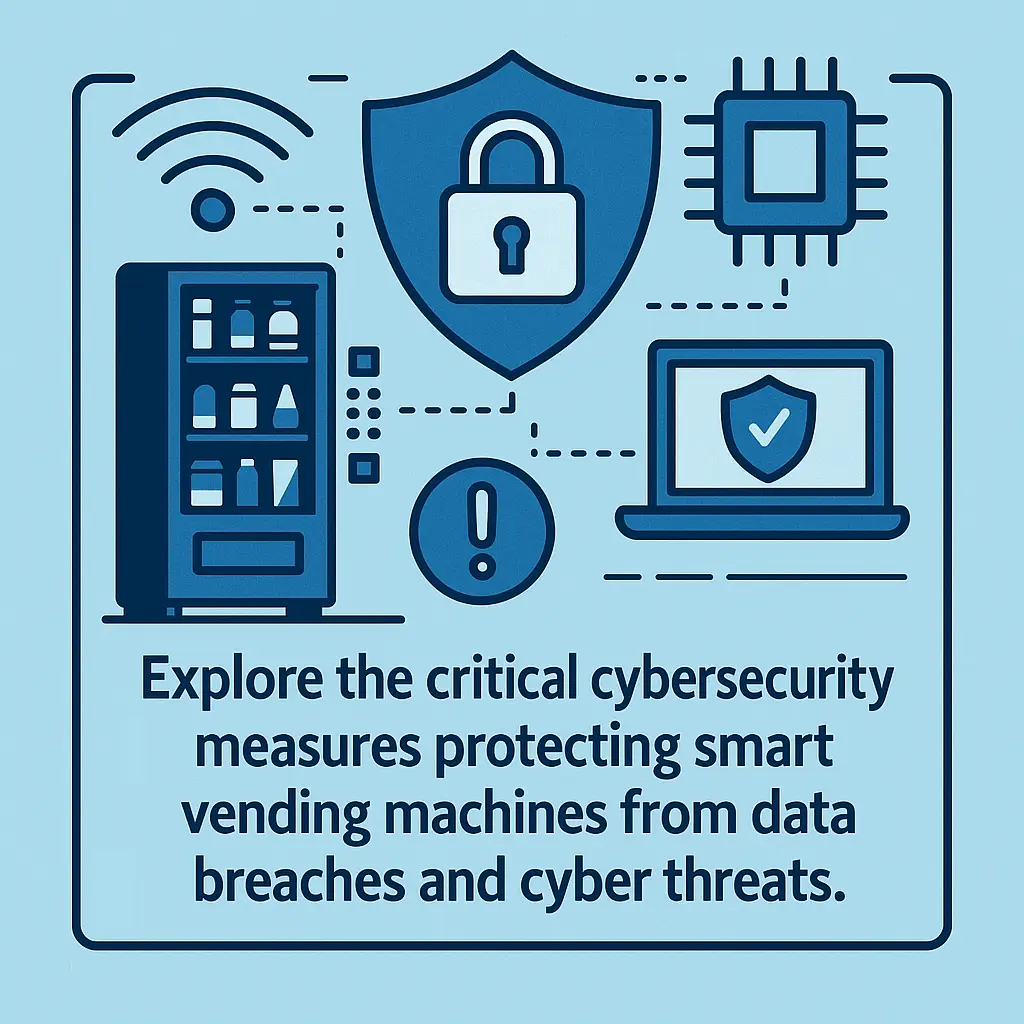Cybersecurity in Smart Vending Networks
Explore the critical cybersecurity measures protecting smart vending machines from data breaches and cyber threats. Safeguard cashless payments and customer information.
Back to Vending Technology ResourcesExplore the critical cybersecurity measures protecting smart vending machines from data breaches and cyber threats. Safeguard cashless payments and customer information.
Back to Vending Technology ResourcesIn an increasingly connected world, smart vending machines offer unparalleled convenience. However, this connectivity also introduces new cybersecurity challenges that demand robust protection strategies.
![]() Advanced encryption secures all payment transactions
Advanced encryption secures all payment transactions
![]() Regular software updates and patch management guard against vulnerabilities
Regular software updates and patch management guard against vulnerabilities
![]() Real-time threat monitoring ensures rapid response to security incidents
Real-time threat monitoring ensures rapid response to security incidents

The evolution from traditional coin-operated machines to sophisticated smart vending networks has revolutionized the industry, offering features like cashless payments, remote inventory management, and real-time sales data. While these advancements bring undeniable benefits, they also introduce a complex landscape of cybersecurity challenges. Protecting these interconnected systems from data breaches, malware, and unauthorized access is not just a technical necessity but a fundamental aspect of maintaining consumer trust and operational integrity.
Modern smart vending machines are essentially IoT (Internet of Things) devices, constantly communicating data over various networks. This requires a multi-layered approach to security, starting from the hardware up through the software and network infrastructure. Encryption is a cornerstone of this defense, safeguarding all transmitted data, especially sensitive cashless payment information. Without robust encryption, payment card details and personal data could be vulnerable to interception. For more insights into how these modern systems handle transactions, consider exploring how cashless vending payment options work.
Beyond data protection, smart vending networks must also defend against operational threats. Malicious actors could attempt to alter pricing, dispense products without payment, or even disrupt the entire network, leading to significant financial losses and reputational damage. Regular firmware updates and patch management are vital to close security loopholes as they are discovered. These updates ensure that machines run on the most secure versions of their operating software, adapting to emerging threats in real-time. Understanding other technological innovations can provide a broader context, such as learning about AI-powered vending machines and their security implications.
Furthermore, the physical security of smart vending machines is integral to their digital security. Tampering with internal components can bypass software protections. Hence, robust physical locks, tamper-detection sensors, and surveillance are often combined with digital monitoring. Operators utilize sophisticated backend management systems to oversee the health and security of their entire fleet, identifying suspicious activity or performance anomalies that could indicate a cyber attack. This comprehensive vigilance ensures the integrity of operations. You can also delve deeper into the overall technological advancements by examining future trends in vending technology.
Smart vending networks integrate vending machines with digital technologies for remote monitoring, cashless payments, and real-time inventory management, often connected to the internet.
Cybersecurity is crucial to protect sensitive customer data, cashless payment information, and prevent unauthorized access or tampering with machine operations.
They can face data breaches, malware attacks, denial-of-service attacks, tampering with pricing or inventory, and unauthorized access to network infrastructure.
Cashless payments are secured through encryption, tokenization, PCI DSS compliance, and secure network protocols to protect cardholder data during transactions.
Data protection involves encryption of personal and payment information, strict access controls, regular security audits, and compliance with data privacy regulations like GDPR.
Yes, smart vending machines can receive over-the-air firmware updates and software patches to address new vulnerabilities and enhance security features.
Network security uses firewalls, intrusion detection systems, and VPNs to secure communications between the machines and central management systems, preventing unauthorized access.
Yes, adherence to standards like PCI DSS for payment processing and general IoT security best practices are critical for securing smart vending networks.
Operators use security information and event management (SIEM) systems and remote monitoring tools to detect suspicious activities and respond to security alerts in real-time.
In case of compromise, immediate steps include isolating the machine, forensic analysis to identify the breach, remediation, and patching all connected units to prevent further incidents.